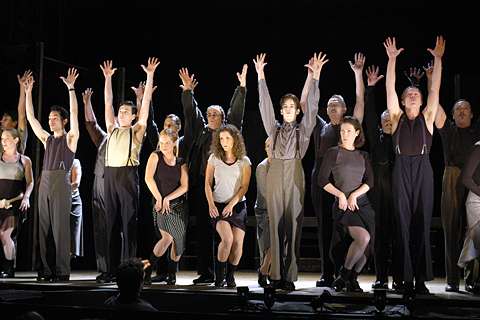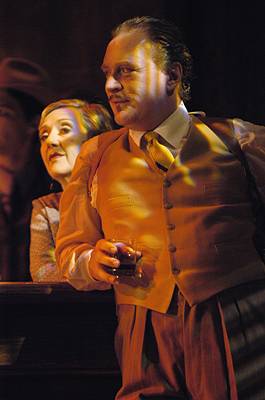|
<< -- 4 -- Malcolm Miller ON THE LAKE

Happy End, set in the Chicago gangsterland of 1919 was composed a year after Threepenny Opera and only ran for a few nights due to the invective of the influential Berlin critic Alfred Kerr who saw the play as derivative, and to its overtly communist message. Yet the score contains some of Weill's finest music, and it was salutary to hear these in the context of the original Guys and Dolls-ish story, in a racy, keenly choreographed and enthusiastically sung production.

A scene from 'Happy End'. Photo © 2003 Andrée Lanthier/Shaw Festival
|
The director Tadeusz Bradecki, whose recent credits include numerous productions in Poland including the National Theatre Warsaw, achieved the effect of Brechtian 'alienation' in the Prologue and Epilogue where all the characters removed their theatrical costume and became a symbol for the public; and the stage action was full of witty detail. Musical director Paul Sportelli, experienced at Shaw Festival and at popular music galas for Stephen Sondheim and Joni Mitchell at Toronto's Harbourfront, maintained a spirited performance with subtle sensitivity to the singers' evocative, cabaret-style rallentandos and pauses, and the colourful ensemble was enhanced by some brilliant accordion playing from Sasha Luminsky, a member of the 'Flying Bulgar Klezmer Band'.

Miriam (Wendy Thatcher) and Bill Cracker (Benedict Campbell) in 'Happy End'. Photo © 2003 Andrée Lanthier/Shaw Festival
|
Highlights included 'The Sailors' Tango' and the classic 'Surabaya Johnny' sung by Lillian Holiday (Blythe Wilson), 'The Bilbao Song', sung by Bill (Benedict Campbell) and various gangsters, 'Mandalay Song' sung in extravagant drag by the hilarious Sammy (Neil Barclay) and the 'Song of the Big Shot' shared by Dr Nakamura (a Japanese-guised Jay Turvey) and Bill. The brusque choruses in mock Salvation Army style, instances of Weill's deft musical humour and skill for pastiche, reminded one of the sheer entertaining wit of this rich period in Weill's music theatre output which preceded his forced exile to Europe and thence Broadway, resulting in radical new influences upon his unique style.
|

